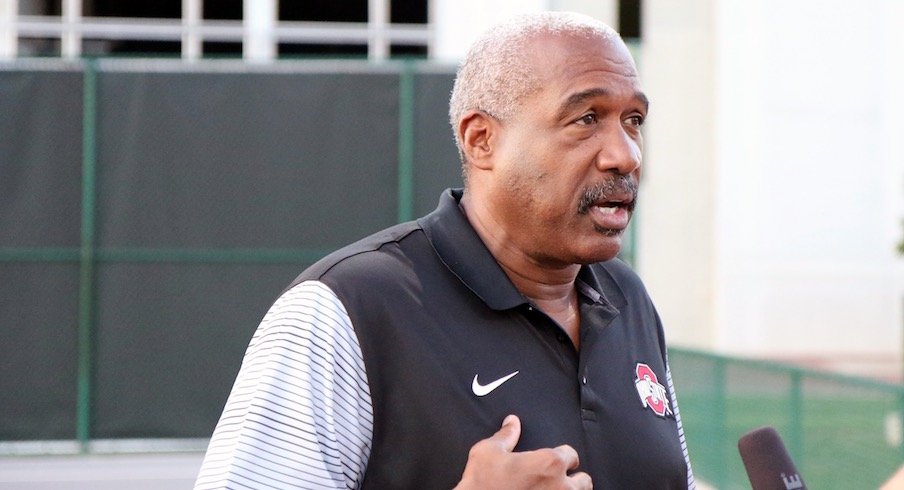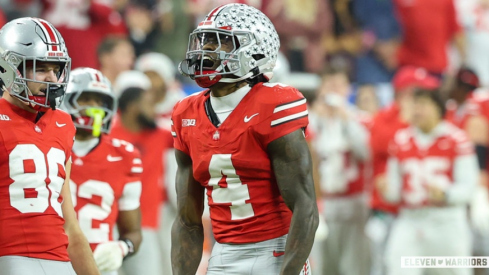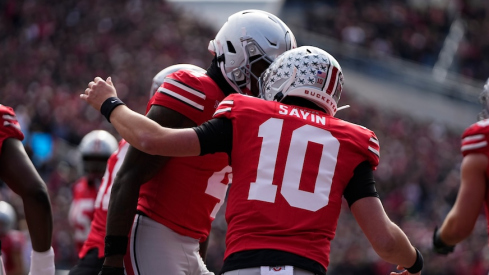Just over one month after he arrived at Ohio State following his transfer from Georgia, new Ohio State quarterback Justin Fields’ request for a waiver for immediate eligibility was approved by the NCAA last Friday.
Following the successful outcome of a process that often takes several months to reach a resolution, Ohio State athletic director Gene Smith is pleased with how quickly a decision was reached and how both Georgia and the NCAA worked with Ohio State to allow for a ruling in Fields’ favor.
“It worked extremely well,” Smith said in an interview with Eleven Warriors on Thursday. “It moved swiftly. I know people probably thought it should move faster, but frankly, in our space, it actually moved pretty quickly.”
It helped, Smith said, that Justin Kume – Ohio State’s associate athletic director for football compliance – already knew Georgia’s director of football compliance. Smith, meanwhile, had conversations with Georgia athletic director Greg McGarity, and said he has a “great relationship” with the people at the NCAA who oversee the transfer waiver process.
Kyle Rowland of the Toledo Blade reported last week that Georgia initially filed a written response with the NCAA objecting to Fields’ waiver request. Smith said Georgia acquiesced, however, after seeing Fields’ written statement to the NCAA and recognizing that Fields did not make any accusations about the University of Georgia’s culture as a whole.
“They were concerned. And they were only concerned about they hadn’t seen a statement. So they were only concerned about what the accusations would be. And rightfully so,” Smith said of Georgia’s initial objection. “I agreed with them. They wanted to be clear that it wasn’t about environment. It wasn’t about Athens or the University of (Georgia). It was a single case, and Justin and his family did a great job in articulating that it was a single case, a single incident.”
Fields’ decision to transfer from Georgia, and subsequent appeal to the NCAA for a waiver for immediate eligibility, stemmed in part from an incident that occurred in September, when Georgia baseball player Adam Sasser used a racial slur toward Fields during the Bulldogs’ football game against Tennessee. Sasser was ultimately dismissed from the Georgia baseball team, and Smith applauded the way Georgia handled that situation, saying it was not indicative of the culture in Athens.
“They don’t have an environment where they’re not respectful to African-Americans or women,” Smith said of Georgia. “This was a single incident involving two people. So it was not anything about their culture. And I wanted to make sure that they understood that we understood that.
“They handled that situation masterfully. Back in the day, when I was coming up, none of that stuff was dealt with the way they dealt with it. So I applauded them. And so at the end of the day, that was a concern for theirs and Justin and his family, where they really addressed that concern.”
“It wasn’t about Athens or the University of (Georgia). It was a single case, and Justin and his family did a great job in articulating that it was a single case, a single incident.”– Gene Smith on Justin Fields' decision to transfer from Georgia to Ohio State
Fields’ case for immediate eligibility has drawn plenty of skepticism, as many people have questioned whether the true motivation for his transfer was the opportunity to start this season at Ohio State, whereas he would have remained Jake Fromm's backup for at least one more year at Georgia. Critics of the NCAA’s ruling have expressed concern that his waiver will open the floodgates for anyone to transfer and be immediately eligible, even if that transfer is only motivated by a desire for more playing time.
Smith, however, believes that Fields’ reason for leaving Georgia is genuine and that it should not set a precedent for other student-athletes to freely transfer and receive immediate eligibility.
“I was hopeful that everybody would understand that it’s a single case, and I think the NCAA got it right,” Smith said. “It was an egregious situation.”
As the NCAA has started to grant waivers for immediate eligibility much more frequently in recent years, Smith acknowledged that it has opened the door for transferring student-athletes to look for anything in their past that they might be able to use to make their case for immediate eligibility.
“I think what we’re finding is the search. People hiring lawyers, the search to try and find how do I fit a waiver into this definition,” Smith said. “And how can I go back and look at my one year there, two years there, three years, whatever it is and find something that fits. So that’s the challenge.”
Smith also believes, though, that it might be time for the NCAA to do away with the waiver process altogether and allow all student-athletes to transfer once without having to sit out a year – as athletes are allowed to do in most non-revenue sports, but not in football, men’s or women’s basketball, baseball or men’s hockey.
“We may get to a point where football and basketball has a one-time transfer exception,” Smith said. “It’s inevitable, in my view. And so, I know that that creates mass chaos to some people, and free agency, but the reality is, the waiver process, it’s a little clunky right now. And if that improves, maybe I’ll feel differently. But I’m really leaning heavily to the one-time transfer.”
Smith acknowledges that he “might be the only AD that ever says that, because everybody sees it as mass chaos.” He also acknowledges that while he believes the one-time transfer exception would not hurt Ohio State, it might hurt smaller Division I programs that would be more susceptible to losing transfers to bigger programs.
Regardless of whether the transfer rules continue to become more relaxed or remain the way they are, Smith believes Ohio State’s priority should be maintaining a culture that deters student-athletes from wanting to transfer. Should a student-athlete choose to transfer and pursue a waiver for immediate eligibility, however, Smith says Ohio State will not stand in his or her way in most cases.
“Our job is to make sure we create that environment where they made the right choice when they came here, and then they don’t want to leave,” Smith said. “If they’re bumping up against playing time, and this is legit and you see it, and they’re not going to have that opportunity and everything else is good, and they want to go, let them go.
“Now it’s harder if they’re transferring in-conference, and you might play against them next week. But the thing that we can’t do is say every case is the same. Every case is different. And you got to look at it on its own merits.”


